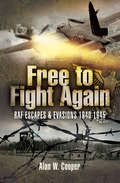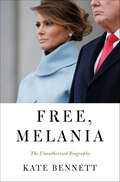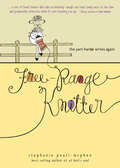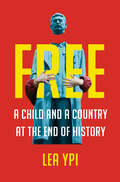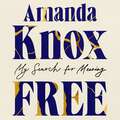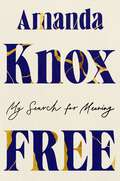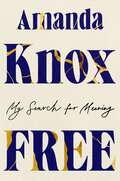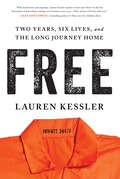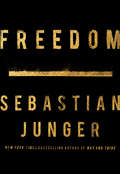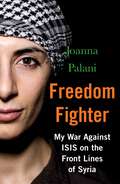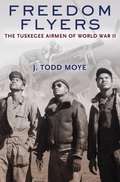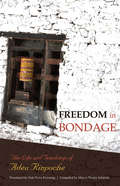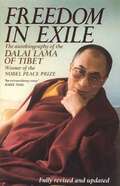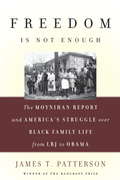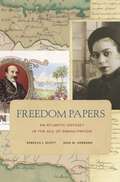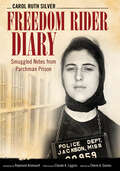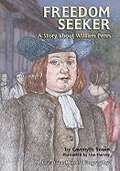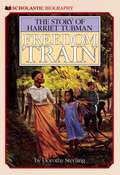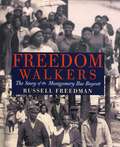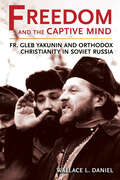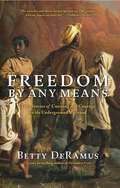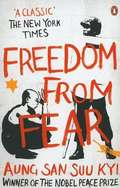- Table View
- List View
Free to Fight Again: RAF Escapes and Evasions, 1940–1945
by Alan W. CooperTo survive baling out from a doomed aircraft or a crash-landing in enemy occupied territory certainly required a large element of luck. To then manage to return to Allied shores inevitably needed considerably more good fortune and often the assistance of local patriots and resistance workers. This book contains the amazing stories of over seventy such escapes, many first-hand accounts. It includes aircrew who found their way to freedom from Europe and places as far away as the Bay of Bengal. There are stories of hi-jacked aircraft, crossing crocodile infested swamps, evasion by camel and coffin, survival in the jungle and brushes with the Gestapo.
Free, Melania: The Unauthorized Biography
by Kate BennettThe first behind-the-scenes look at the life of the most enigmatic First Lady in US history.Melania Trump is an enigma. Regardless of your political leanings, she is fascinating—and one of the most groundbreaking First Ladies in history. A former model who speaks five languages, her upbringing in a former communist country spurred a relentless drive for stability. A reluctant pillar in a controversial presidential administration, she ran the East Wing like none of her predecessors ever could. But who is she really?In Free, Melania we get an insider’s look at Melania Trump, from her childhood in Slovenia to her days in the White House, and everything in between. We get a behind-the-scenes look at her relationship with Donald, and her role in Trump family dynamics, including her strained relationship with Ivanka. We get a rare glimpse into her famous clothing choices (including the message behind her controversial jacket, “I Really Don’t Care, Do U?”, worn on a visit to the US-Mexico border), and how a publicly quiet Melania actually speaks very loudly—if you just know where, and how, to listen.
Free-Range Knitter: The Yarn Harlot Writes Again
by Stephanie Pearl-McPheeThe author of Yarn Harlot returns with more hilarious personal stories about all the ups and downs of being a knitter.Stephanie Pearl-McPhee (a.k.a. the Yarn Harlot) returns to pen another hilarious, insightful, and poignant collection of essays surrounding her favorite topics: knitting, knitters, and what happens when you get those two things anywhere near ordinary people. Free-Range Knitters shares stories of knitting horrors and triumphs and knitting successes and defeats, but, mostly, it shares stories about the human condition that ring true for everyone—especially if you have to have a rather large amount of yarn in your house.Praise for Yarn Harlot“Stephanie Pearl-McPhee turns both typical and unique knitting experiences into very funny and articulate prose.” —Meg Swansen, Schoolhouse Press“I laughed until my stitches fell helplessly from my needles!” —Lucy Neatby, author of Cool Socks Warm Feet“A sort of David Sedaris-like take on knitting—laugh-out-loud funny most of the time and poignantly reflective when it’s not cracking you up.” —Library Journal
Free: A Child and a Country at the End of History
by Lea YpiShortlisted for the 2021 Baillie Gifford Prize for Non-Fiction Shortlisted for the 2021 Costa Biography Award The Sunday Times Best Book of the Year in Biography and Memoir A Financial Times Best Book of 2021 (Critics' Picks) The New Yorker, Best Books We Read in 2021 Times Literary Supplement Book of the Year 2021 A Guardian Best Book of the Year A reflection on "freedom" in a dramatic, beautifully written memoir of the end of Communism in the Balkans. For precocious 11-year-old Lea Ypi, Albania’s Soviet-style socialism held the promise of a preordained future, a guarantee of security among enthusiastic comrades. That is, until she found herself clinging to a stone statue of Joseph Stalin, newly beheaded by student protests. Communism had failed to deliver the promised utopia. One’s “biography”—class status and other associations long in the past—put strict boundaries around one’s individual future. When Lea’s parents spoke of relatives going to “university” or “graduating,” they were speaking of grave secrets Lea struggled to unveil. And when the early ’90s saw Albania and other Balkan countries exuberantly begin a transition to the “free market,” Western ideals of freedom delivered chaos: a dystopia of pyramid schemes, organized crime, and sex trafficking. With her elegant, intellectual, French-speaking grandmother; her radical-chic father; and her staunchly anti-socialist, Thatcherite mother to guide her through these disorienting times, Lea had a political education of the most colorful sort—here recounted with outstanding literary talent. Now one of the world’s most dynamic young political thinkers and a prominent leftist voice in the United Kingdom, Lea offers a fresh and invigorating perspective on the relation between the personal and the political, between values and identity, posing urgent questions about the cost of freedom.
Free: My Search for Meaning
by Amanda KnoxAmanda Knox spent nearly four years in prison and eight years on trial for a murder she didn't commit - and became a notorious tabloid story in the process. Though she was exonerated, it's taken more than a decade for her to reclaim her identity and truly feel free. Free recounts how Amanda survived prison, the mistakes she made and misadventures she had reintegrating into society, culminating in the untold story of her return to Italy and the extraordinary relationship she's built with the man who sent her to prison. It is the gripping saga of what happens when you become the definition of notorious, but have quietly returned to the matters of a normal life - seeking a life partner, finding a job, or even just going out in public. In harrowing (and sometimes hilarious) detail, Amanda tells the story of her personal growth and hard‑fought wisdom, recasting her public reckoning as a private reflection on the search for meaning and purpose that will speak to everyone persevering through hardship.
Free: My Search for Meaning
by Amanda KnoxAmanda Knox spent nearly four years in prison and eight years on trial for a murder she didn't commit - and became a notorious tabloid story in the process. Though she was exonerated, it's taken more than a decade for her to reclaim her identity and truly feel free. Free recounts how Amanda survived prison, the mistakes she made and misadventures she had reintegrating into society, culminating in the untold story of her return to Italy and the extraordinary relationship she's built with the man who sent her to prison. It is the gripping saga of what happens when you become the definition of notorious, but have quietly returned to the matters of a normal life - seeking a life partner, finding a job, or even just going out in public. In harrowing (and sometimes hilarious) detail, Amanda tells the story of her personal growth and hard‑fought wisdom, recasting her public reckoning as a private reflection on the search for meaning and purpose that will speak to everyone persevering through hardship.
Free: My Search for Meaning
by Amanda KnoxAmanda Knox reflects on her world-famous confinement in an Italian prison and her return to an &“ordinary&” life—revealing hard-won truths about purpose and fulfillment. Amanda Knox spent nearly four years in prison and eight years on trial for a murder she didn&’t commit—and became a notorious tabloid story in the process. Though she was exonerated, it&’s taken more than a decade for her to reclaim her identity and truly feel free. Free recounts how Knox survived prison, the mistakes she made, the misadventures she had reintegrating into society, and culminates in the untold story of her return to Italy—and the extraordinary relationship she&’s built with the man who sent her to prison. It is the gripping saga of what happens when you become the definition of notorious, but have quietly returned to the matters of a normal life—seeking a life partner, finding a job, or even just going out in public. In harrowing (and sometimes hilarious) detail, Amanda tells the story of her personal growth and hard-fought wisdom, recasting her public reckoning as a private reflection on the search for meaning and purpose that will speak to everyone persevering through hardship.
Free: Two Years, Six Lives, and the Long Journey Home
by Lauren Kessler95 percent of the millions of American men and women who go to prison eventually get out. What happens to them?There's Arnoldo, who came of age inside a maximum security penitentiary, now free after nineteen years. Trevor and Catherine, who spent half of their young lives behind bars for terrible crimes committed when they were kids. Dave, inside the walls for 34 years, now about to reenter an unrecognizable world. Vicki, a five-time loser who had cycled in and out of prison for more than a third of her life. They are simultaneously joyful and overwhelmed at the prospect of freedom. Anxious, confused, sometimes terrified, and often ill-prepared to face the challenges of the free world, all are intent on reclaiming and remaking their lives.What is the road they must travel from caged to free? How do they navigate their way home?A gripping and empathetic work of immersion reportage, FREE reveals what awaits them and the hundreds of thousands of others who are released from prison every year: the first rush of freedom followed quickly by institutionalized obstacles and logistical roadblocks, grinding bureaucracies, lack of resources, societal stigmas and damning self-perceptions, the sometimes overwhelming psychological challenges. Veteran reporter Lauren Kessler, both clear-eyed and compassionate, follows six people whose diverse stories paint an intimate portrait of struggle, persistence, and resilience.The truth—the many truths—about life after lockup is more interesting, more nuanced, and both more troubling and more deeply triumphant than we know.
Freedom
by Sebastian JungerA profound rumination on the concept of freedom from the New York Times–bestselling author of Tribe Throughout history, humans have been driven by the quest for two cherished ideals: community and freedom. The two don’t coexist easily; we value individuality and self-reliance yet are utterly dependent on community for our most basic needs. In this intricately crafted and thought-provoking book, Sebastian Junger examines the tension that lies at the heart of what it means to be human. For much of a year, Junger and three friends—a conflict photographer and two Afghan war vets—walk the railroad lines of the east coast of the United States. It is an experiment in personal autonomy, but also in interdependence. Dodging railroad cops, sleeping under bridges, cooking over fires and drinking from creeks and rivers, the four men forge a unique reliance on one another. In Freedom, Junger weaves his account of this journey with other topics: primatology and boxing strategy, the history of labour strikes and Apache renegades, the role of women in resistance movements, and the brutal reality of life on the Pennsylvania frontier. Written in exquisite, razor-sharp prose, the result is a powerful examination of the primary desire that defines us.
Freedom Fighter: My War Against ISIS on the Frontlines of Syria
by Joanna PalaniJoanna Palani made headlines across the world when her role fighting ISIS in the Syrian conflict was revealed. Inspired by the Arab Spring, Joanna left behind her student life in Copenhagen and traveled to the Middle East in order to join the YPJ—the all-female brigade of the Kurdish militia in Syria. After undergoing considerable military training, including as a saboteur and sniper, Joanna served as a YPJ fighter over several years and took part in the brutal siege of Kobani. Despite her heroism, she was taken into custody on her return to Denmark for breaking laws designed to stop citizens from joining ISIS, making her the first person to be jailed for joining the international coalition. In this raw and unflinching memoir, Joanna provides an eye-witness account of this devastating war and reveals the personal cost of the battles she has fought on and off the frontlines.
Freedom Flyers: The Tuskegee Airmen of World War II
by J. Todd MoyeAs the country's first African American military pilots, the Tuskegee Airmen fought in World War II on two fronts: against the Axis powers in the skies over Europe and against Jim Crow racism and segregation at home. Although the pilots flew more than 15,000 sorties and destroyed more than 200 German aircraft, their most far-reaching achievement defies quantification: delivering a powerful blow to racial inequality and discrimination in American life. In this inspiring account of the Tuskegee Airmen, historian J. Todd Moye captures the challenges and triumphs of these brave pilots in their own words, drawing on more than 800 interviews recorded for the National Park Service's Tuskegee Airmen Oral History Project. Denied the right to fully participate in the U. S. war effort alongside whites at the beginning of World War II, African Americans--spurred on by black newspapers and civil rights organizations such as the NAACP--compelled the prestigious Army Air Corps to open its training programs to black pilots, despite the objections of its top generals. Thousands of young men came from every part of the country to Tuskegee, Alabama, in the heart of the segregated South, to enter the program, which expanded in 1943 to train multi-engine bomber pilots in addition to fighter pilots. By the end of the war, Tuskegee Airfield had become a small city populated by black mechanics, parachute packers, doctors, and nurses. Together, they helped prove that racial segregation of the fighting forces was so inefficient as to be counterproductive to the nation's defense. Freedom Flyersbrings to life the legacy of a determined, visionary cadre of African American airmen who proved their capabilities and patriotism beyond question, transformed the armed forces--formerly the nation's most racially polarized institution--and jump-started the modern struggle for racial equality.
Freedom In Bondage
by Tsoknyi Rinpoche Adeu RinpocheAdeu Rinpoche's story is not about the horrors he endured under the Communist takeover of Tibet--he himself notes that many other people underwent much worse hardships, not to mention all those that died--but rather the way in which he told his tale. While describing what happened to him and many others, how he survived and finally his release from prison he spoke in a straightforward, dignified manner without any resentment, anger or sadness. He never added mental anguish on top of an already untenable experience. He viewed what happened to him as a ripening of his own individual karma, he accepted responsibility for the abuse he suffered; in fact, he repeatedly stated that each person suffered according to their own karma, as he said, "I felt that whatever befalls you is a ripening of the specific karma that you created in the past."Adeu Rinpoche took the trauma and suffering as an opportunity not only to accept the vicissitudes of life without bitterness but also to transcend the unjust treatment by not harboring ill-will against the perpetrators, instead developing compassion for them. In the end he turned suffering into happiness, for even while imprisoned he was able to meet many great masters, receive teachings from them and even do some serious practice. It is truly inspiring that people exist in our world with such profound realization and accomplishment-they are examples to us all.This tale together with wonderful teachings presents a compassionate and wise face to the hardship Adeu Rinpoche and so many others endured and triumphed over. It is a banquet of realization, pith instructions and dignity.
Freedom In Exile: The Autobiography of The Dalai Lama
by Dalai LamaThis is the autobiography of H.H. The Dalai Lama of Tibet.
Freedom In Exile: The Autobiography of the Dalai Lama of Tibet
by His Holiness The Dalai LamaThe autobiography of the Dalai Lama of Tibet, a fascinating insight into the mind of one of the greatest contemporary spiritual leaders'An extraordinary story' Daily Mail'Compelling, fascinating, eye-opening' Washington Post'A vital historical witness, not only to inhumanity but to compassion' Los Angeles Times'Forthright... often amusing' New York TimesIn 1938 a two-year-old boy was recognised through a traditional process of discovery as being the reincarnation of all previous Dalai Lamas, the spiritual rulers of Tibet. Taken away from his parents, he was brought up in Lhasa according to a monastic regimen of rigorous austerity and in almost total isolation. Aged seven he was enthroned in the 1000-room Potala palace as the supreme spiritual leader of a nation the size of Western Europe, with population of six million. And at fifteen, he became head of state.With Tibet under threat from the newly Communist Chinese, there followed a traumatic decade during which he became the confidant of both Chairman Mao and Jawaharal Nehru as he tried to maintain autonomy for his people. Then in 1959, he was finally forced into exile - followed by over 100,000 destitute refugees. Here, in his own words, he describes what it was like to grow up revered as a deity among his people, reveals his innermost feelings about his role, and discusses the mysteries of Tibetan Buddhism.
Freedom Is Not Enough: The Moynihan Report and America's Struggle over Black Family Life -- from LBJ to Obama
by James PattersonOn June 4, 1965, President Lyndon Johnson delivered what he and many others considered the greatest civil rights speech of his career. Proudly, Johnson hailed the new freedoms granted to African Americans due to the newly passed Civil Rights Act and Voting Rights Act, but noted that "freedom is not enough. ” The next stage of the movement would be to secure racial equality "as a fact and a result. ” The speech was drafted by an assistant secretary of labor by the name of Daniel Patrick Moynihan, who had just a few months earlier drafted a scorching report on the deterioration of the urban black family in America. When that report was leaked to the press a month after Johnson’s speech, it created a whirlwind of controversy from which Johnson’s civil rights initiatives would never recover. But Moynihan’s arguments proved startlingly prescient, and established the terms of a debate about welfare policy that have endured for forty-five years. The history of one of the great missed opportunities in American history, Freedom Is Not Enough will be essential reading for anyone seeking to understand our nation’s ongoing failure to address the tragedy of the black underclass.
Freedom Not Far Distant: A Documentary History of Afro-Americans in New Jersey
by Clement Alexander PriceThis book is an extensive compilation of documents which shed light on the lives of African Americans in New Jersey, from colonial times to the 1970s. It includes Quaker manifestos against slavery, slave narratives, speeches for and against emancipation, accounts of early schools for black children, writings about the civil rights movement of the 1960s, and much more.
Freedom Papers
by Rebecca J. Scott Jean M. HebrardAround 1785, a woman was taken from her home in Senegambia and sent to Saint-Domingue in the Caribbean. Those who enslaved her there named her Rosalie. Her later efforts to escape slavery were the beginning of a family's quest, across five generations and three continents, for lives of dignity and equality. Freedom Papers sets the saga of Rosalie and her descendants against the background of three great antiracist struggles of the nineteenth century: the Haitian Revolution, the French Revolution of 1848, and the Civil War and Reconstruction in the United States. Freed during the Haitian Revolution, Rosalie and her daughter Elisabeth fled to Cuba in 1803. A few years later, Elisabeth departed for New Orleans, where she married a carpenter, Jacques Tinchant. In the 1830s, with tension rising against free persons of color, they left for France. Subsequent generations of Tinchants fought in the Union Army, argued for equal rights at Louisiana's state constitutional convention, and created a transatlantic tobacco network that turned their Creole past into a commercial asset. Yet the fragility of freedom and security became clear when, a century later, Rosalie's great-great-granddaughter Marie-José was arrested by Nazi forces occupying Belgium. Freedom Papers follows the Tinchants as each generation tries to use the power and legitimacy of documents to help secure freedom and respect. The strategies they used to overcome the constraints of slavery, war, and colonialism suggest the contours of the lives of people of color across the Atlantic world during this turbulent epoch.
Freedom Rider Diary: Smuggled Notes from Parchman Prison (Willie Morris Books in Memoir and Biography)
by Carol Ruth SilverArrested as a Freedom Rider in June of 1961, Carol Ruth Silver, a twenty-two-year-old recent college graduate originally from Massachusetts, spent the next forty days in Mississippi jail cells, including the Maximum-Security Unit at the infamous Parchman Prison Farm. She chronicled the events and her experiences on hidden scraps of paper which amazingly she was able to smuggle out. These raw written scraps she fashioned into a manuscript, which has waited, unread for more than fifty years. Freedom Rider Diary is that account. Freedom Riders were civil rights activists who rode interstate buses into the segregated southern United States in 1961 to test the US Supreme Court rulings outlawing segregation in interstate bus and terminal facilities. Brutality and arrests inflicted on the Riders called national attention to the disregard for federal law and the local violence used to enforce segregation. Police arrested Riders for trespassing, unlawful assembly, and violating state and local Jim Crow laws, along with other alleged offenses, but they often allowed white mobs to attack the Riders without arrest or intervention. This book offers a heretofore unavailable detailed diary from a woman Freedom Rider along with an introduction by historian Raymond Arsenault, author of the definitive history of the Freedom Rides. In a personal essay detailing her life before and after the Freedom Rides, Silver explores what led her to join the movement and explains how, galvanized by her actions and those of her compatriots in 1961, she spent her life and career fighting for civil rights. Framing essays and personal and historical photographs make the diary an ideal book for the general public, scholars, and students of the movement that changed America.
Freedom Seeker: A Story About William Penn (A Creative Minds Biography)
by Gwenyth SwainThe son of a wealthy, repected admiral, William Penn did what was forbidden in seventeenth-century England--he openly practiced the Quaker religion. Penn dreamed of a place with freedom of religion. He asked for land in the New World and was given a colony called Pennsylvania. His success in establishing a new and just government there later became the blueprint for thirteen newly independent colonies.
Freedom Train: The Story of Harriet Tubman
by Dorothy SterlingBorn into slavery, young Harriet Tubman knew only hard work and hunger. Escape seemed impossible-- certainly dangerous. Yet Harriet did escape North, by the secret route called the Underground Railroad. Once she was free, Harriet didn't forget her people.
Freedom Walkers: The Story of the Montgomery Bus Boycott
by Russell Freedman<P>On December 1, 1955, Rosa Parks refused to move to the back of a bus and give up her seat to a white man. Her quiet refusal to surrender her dignity sparked the Montgomery bus boycott, which eventually ended segregation on buses. But the boycott did not start or end there, and here Newbery Medalist Russell Freedman breathes life into all the key personalities and events that contributed to the yearlong struggle, a major victory in the civil rights movement. <P>[This text is listed as an example that meets Common Core Standards in English language arts in grades 6-8 at http://www.corestandards.org.]
Freedom and the Captive Mind: Fr. Gleb Yakunin and Orthodox Christianity in Soviet Russia (NIU Series in Orthodox Christian Studies)
by Wallace L. DanielFreedom and the Captive Mind is a biography of Fr. Gleb Yakunin, the first Orthodox priest to adopt an ecumenical approach to Russian Orthodoxy, earning him the enmity of conservative groups within the Church and gratitude from other religious denominations. Father Yakunin believed the survival of the Church depended on its willingness to reform. When he was suspended, Yakunin continued to fight the system, working to expose the persecution of religious believers in the Soviet Union. After years of exile, Yakunin entered politics. He was criticized by religious authorities, denounced by nationalist politicians, and excommunicated by the Russian Orthodox Church. As Wallace L. Daniel demonstrates, the letters Yakunin wrote and his revelations about the relationship between the Church hierarchy and the KGB stand as monuments of courage and the determination to reveal the truth about abuses of power and the authoritarian mindset that predominated in both institutions.
Freedom by Any Means
by Betty DeramusIn this powerful follow-up to her Essence bestseller Forbidden Fruit, Betty DeRamus explores the ingenious ways slaves wrestled freedom for themselves and their loved ones.In Forbidden Fruit DeRamus told the real-life love stories of enslaved African Americans whose relationships with each other and whites flourished in spite of the horrendous circumstances of the antebellum period. With the same lyrical style and attention to detail, Freedom By Any Means explains how African Americans resorted to using extraordinary methods to maintain their seemingly impossible personal relationships during this time of terror. Besides the tactics of running away together or raising money to buy their freedom, loved ones filed successful lawsuits, became military spies or counterspies, and used rumors of voodoo to create bluffs and tricks. Riveting and surprising, Betty DeRamus captures the tumultuous lives of the humans in inhumane situations who were able to salvage their families and marriages and achieve freedom together in spite of tremendous odds. Freedom By Any Means also features the return of many of the beloved figures from her previous book Forbidden Fruit, including Lucy Nichols, Al and Margaret Wood, and Sylvia and Louis Stark. This inspiring account steeped in rich historical research attests to the resolve of the human spirit and is a welcome addition to the library of American historical texts on this period.
Freedom from Fear
by Aung San Suu KyiAung San Suu Kyi, human-rights activist and leader of Burma's National League for Democracy, was detained in 1989 by SLORC, the ruling military junta. . This collection of writings reflects Aung San Suu Kyi's greatest hopes and fears for her people and her concern about the need for international cooperation, and gives poignant and humorous reminiscences as well as independent assessments of her role in politics. Containing speeches, letters and interviews, these writings give a voice to Burma's 'woman of destiny', who was awarded the Sakharov Prize for Freedom of Thought and the 1991 Nobel Peace Prize.
